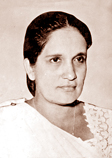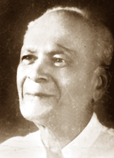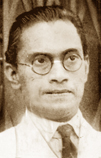Turmoil in the country during 1956-59 MEP regime
by W.T.A. Leslie FERNANDO
Although the 1956-59 MEP regime brought about a transformation in the
country beneficial to the commoners, it was also a period of turmoil as
well. It was the language issue that took the most serious turn of
events.
When Sinhala was made the State language, the Tamil parties launched
a civil disobedience movement. Although after making Sinhala the State
language provisions for the reasonable use of Tamil was mooted but they
were never properly implemented. As a result a civil disobedience
movement gathered support from the Tamils. This in turn led to a
Sinhalese backlash culminating in the riots of 1958. They caused some
deaths as well.
 |
 |
 |
 |
| C.P. de
Silva. |
Sirimavo Bandaranaike |
W. Dahanayake |
S.W.R.D. Bandaranaike |
The Bandaranaike-Chelvanayagam Pact was signed in 1957 to resolve the
ethnic conflict. In this settlement Sinhala was accepted as the official
language and Tamil was made the regional language in Northern and
Eastern provinces. The regional councils were to be set up with one for
the North and one or more for the East. The powers over the land were
vested on them and there were also provisions for two or more regional
councils to merge.
There was severe opposition to the Bandranaike Chelvanayakam Pact. It
was criticised as the first step towards the formation of a separate
State. The power given to regional councils to merge was considered
dangerous. It was opposed by many Sinhalese led by the Maha Sangha. Even
the UNP organised a protest march to Kandy against it. Eventually
S.W.R.D. Bandaranaike was forced to abrogate the Pact.
Another problem the 1956-59 MEP government had to face was the
massive wave of strikes. At the beginning both the LSSP and the CP
opposed the MEP government. However the unexpected victory of the UNP at
the Colombo M.C. elections held at the end of 1956 made the CP to mellow
its attitude towards the MEP whereas the LSSP continued its policy to
embarrass the Government. The LSSP condemned making Sinhala the State
language and giving prominence to Buddhism as communalistic and
reactionary.
The country witnessed a massive wave of isolated as well as general
strikes and the LSSP took a major role in leading them. The relevant
leniency in the response shown by the government in dealing with trade
unions were put to maximum advantage. These strikes occurred mostly in
the public sector and frequently government services and industry were
paralysed.
Although at one time Dr. N.M. Perera and some other leaders in the
LSSP were willing to join the government to strengthen the progressive
camp, the LSSP continued to embarrass the Government. It is true that
most of the strikes were sparked off by economic issues. Nevertheless
this period also witnessed purely political strikes. The CMU, a major
trade union led by a leader of the LSSP condemned the government of
communal vandalism. At the general election in March 1960, Mrs. Sirimavo
Bandaranaike referring to the wave of strikes accused that it was Dr.
N.M. Perera who caused the death of S.W.R.D. Banadaranaike without
killing him ("Mage Samiya Nomara Maruve N.M. Pereaya").
It was alleged that the main cause of the conflicts in the 1956-59
Cabinet was impetuous attitude of Philip Gunawardena. It is true that
Philip was relentless and invective so as to embarrass some of his
Cabinet colleagues. But it was an exaggeration to accuse that the
arrogance of Philip Gunawardena was solely responsive for the conflicts
in the Cabinet.
In 1957 Philip wanted to nationalise the foreign-owned estates.
However he deferred it on the request of Prime Minister Bandaranike. He
reluctantly agreed to make amendments to the Paddy Lands Act made by the
Cabinet. Philip conceded to allow S.W.R.D. Bandaranaike to present his
controversial Co-operative Bank Bill in Parliament.
Another accusation made against Philip Gunawardena was that no public
officer could work with him. Philip activated dormant public officers
and on the contrary, K. Alvapillai, his permanent secretary of the
Ministry of Agriculture and Food well and truly counter acts allegation.
He expresses that it was very pleasant to work with Philip Gunawardena
and Philip won the admiration of all the officers under him.
He acknowledges that Philip had the knack to select the best person
suited for the job and entrust with responsibility. He further says that
Philip had to leave the Cabinet not because he did not extend his
co-operation to the Prime Minister Bandaranaike but because those who
were jealous of Philip's ability in plan implementation and as
administrator stood in the way of such co-operation. He adds 'I knew
that Philip Gunawardena leaving the Cabinet was painful to S.W.R.D.
Bandaranaike".
S.W.R.D. Bandaranaike formed a sole SLFP government after Philip and
William de Silva left the Cabinet in May 1959. But his problems did not
end there. The reactionary elements brought pressure on the Prime
Minister Bandaranaike to get tenders, contracts and for their other
irregular activities. When he did not yield to them, it antagonised them
and they began to conspire and plot against S.W.R.D. Ultimately S.W.R.D.
Bandaranaike was assassinated on September 26, 1959 being shot by a
Buddhist Bhikku instigated by them.
After the death of S.W.R.D. Bandaranaike there was so much confusion
in the country. Ven. Mapitigama Buddharakkitha Thera, the 2nd accused in
the Bandaranaike assassination case who was later convicted for
conspiring to kill S.W.R.D. even addressed the nation by the Government
radio. From 1958 Philip Gunawardena had been warning S.W.R.D.
Bandaranaike that there was a conspiracy. But Bandaranaike did not pay
heed to it and had to pay with his life for it.
On the death of S.W.R.D. Bandaranaike the next in line in the SLFP
was C.P. de Silva. But he had gone abroad for medical treatment and W.
Dahanayake was appointed Prime Minister. W. Dahanayake adopted a
dictatorial attitude and he even censured the media. There was delay to
arrest those connected with the assassination of S.W.R.D. and there were
rumours that the Government wanted to shield them. There were stories
that Wimala Wijayawardena who was arrested later too refuge in the
"Temple Trees", the residence of Prime Minister.
In this background when the Opposition moved a vote of no confidence
against the Government even some Cabinet Ministers did not come to the
rescue of W. Dahanayake and the Government managed deafeat it only by
one vote. Prime Minister Dahanayake was furious and he expelled some
SLFP Ministers who went against him and formed a Cabinet of his own.
W. Dahanayake set up a new Ministry of Internal Security and made
Sidney de Zoysa its secretary. Some suspected that W. Dahanayake was
preparing the ground to set up an administration similar to the Catholic
dictatorship of Din Diem in South Vietnam found at that time.
Nevertheless in the light of the Opposition to his government from all
quarters W. Dahanayake was compelled to dissolve Parliament and call for
nomination on January 4, 1960.
Around this time there was a new set up in the political scene in Sri
Lanka. As the SLFP was in disarray without a powerful leader, the UNP
with Dudley Senanayake coming back as the leader expected an easy
victory. SLFP entered the fray led by C.P. de Silva. The VLSSP which had
now assumed the name MEP formed an alliance with the Dharma Samaja Party
led by L.H. Meththananda committed to bring about a Buddhist resurgence.
The LSSP had high hopes of forming the next government. It even
rejected a move by the Communist Party to form a United Left Front. W.
Dahanayake formed the Lanka Prajathanthravadi Party, in collaboration
with Stanley de Zoysa. Some powerful Catholics too supported the LPP.
When the nominations were called for the general election which was
fixed for March 19, 1960, 21 political parties including some small ones
entered the fray.
|

